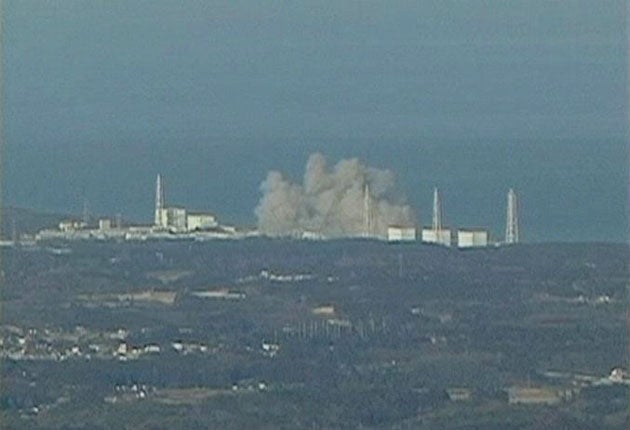Fears of radioactive leak after blast rips through complex

Your support helps us to tell the story
From reproductive rights to climate change to Big Tech, The Independent is on the ground when the story is developing. Whether it's investigating the financials of Elon Musk's pro-Trump PAC or producing our latest documentary, 'The A Word', which shines a light on the American women fighting for reproductive rights, we know how important it is to parse out the facts from the messaging.
At such a critical moment in US history, we need reporters on the ground. Your donation allows us to keep sending journalists to speak to both sides of the story.
The Independent is trusted by Americans across the entire political spectrum. And unlike many other quality news outlets, we choose not to lock Americans out of our reporting and analysis with paywalls. We believe quality journalism should be available to everyone, paid for by those who can afford it.
Your support makes all the difference.Japan was battling to head off a further catastrophe last night, after a nuclear power station damaged by the earthquake was rocked by a huge explosion.
The blast at the Fukushima plant destroyed the building housing the reactor and injured four workers who had been struggling to keep control of the unit in the wake of the devastating earthquake and tsunami.
After Japan's nuclear industry watchdog warned that the risk of overheating at Fukushima Daiichi's Unit 1 left it in danger of nearing meltdown, officials began using seawater as a coolant, to prevent damage to the steel chamber containing the radioactive core.
But, as the country's Prime Minister, Naoto Kan, appealed for calm over the state of the reactor, a nuclear consultant, John Large, claimed the explosion must have dispersed "a lot of radioactivity". He said: "It defies the Japanese government line that the [reactor] vessel is still intact. The reality is that this plant has been devastated by an explosion. I'd expect to see a significant nuclear release."
The blast immediately provoked fears that Japan could be plunged into the worst nuclear contamination incident since the disaster at Chernobyl, 25 years ago.
Thousands were evacuated yesterday as workers were forced to vent radioactive gas from the 40-year-old plant, and officials later conceded that the number of people exposed to radiation from the plant could reach 160.
Mr Kan declared a state of emergency at the Fukushima 1 and 2 power plants, 160 miles north-east of Tokyo, which lost their cooling ability.
The blast destroyed the walls and roof of the building around the reactor, one of six at the Daiichi site, although officials said the container housing the reactor was not damaged. The Tokyo Electric Power Company, which operates the Daiichi site, said it had also lost cooling ability at a second reactor there and at three units at its nearby Fukushima Daini site. The government confirmed last night that it had been told of an emergency at Daiichi's Unit 3.
As the situation deteriorated, and pressure at Daiichi 1 rose to twice the normal level, the authorities ordered the evacuation of thousands of people within a 20km radius of the plant, which lies south of the heavily damaged city of Sendai. The Nuclear and Industrial Safety Agency confirmed that two radioactive substances, caesium and iodine, had been detected nearby. A medical team from the National Institute of Radiological Sciences was dispatched to Fukushima "as a precaution".
"The safety of people around the Fukushima nuclear plant is our number-one priority," Mr Kan said.
The International Atomic Energy Agency said flooding had disabled the diesel generators required to maintain cooling systems. Ryohei Shiomi, an official with Japan's nuclear safety commission, said subsequent overheating raised the prospect of meltdown at one of the reactors. The authorities detected eight times normal radiation levels outside the facility and 1,000 times normal inside Unit 1's control room, as staff struggled to reduce heat and pressure inside the reactor.
The Chief Cabinet Secretary, Yukio Edano, later said that radiation levels in the area had since fallen and were "now settled at a low level".
But Ken Courtis, a former vice-chairman of the investment bank Goldman Sachs in Asia, said it was vital that authorities regained control of the unit within hours. "A meltdown, which would cause massive immediate damage, would set the nuclear industry back decades. It would have vast implications for the global energy equation and the world economy," he said.
The immediate impact of the shutdown in Fukushima was a warning of severe power cuts. Japan relies on its 54 nuclear power stations to provide some 30 per cent of its electricity.
Join our commenting forum
Join thought-provoking conversations, follow other Independent readers and see their replies
Comments